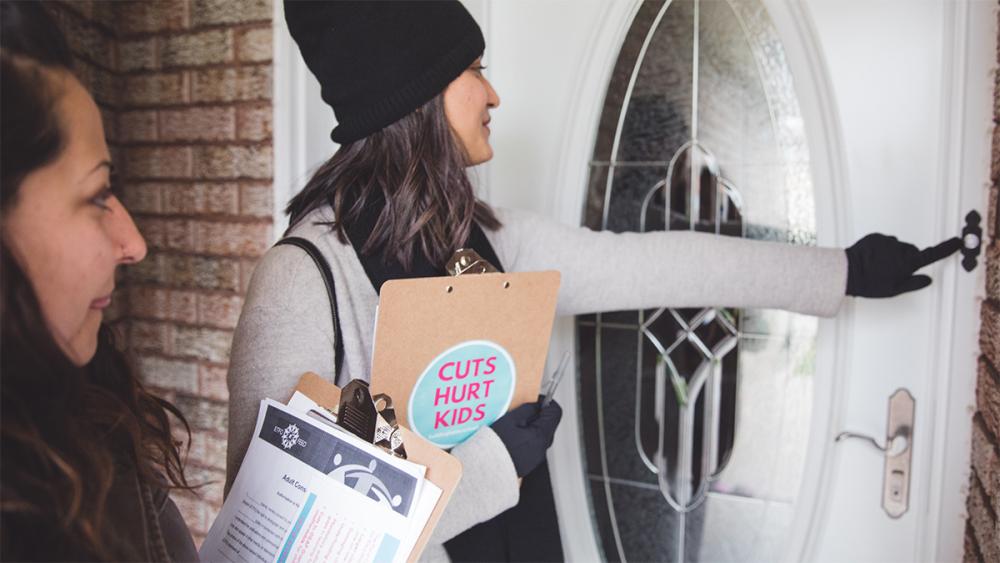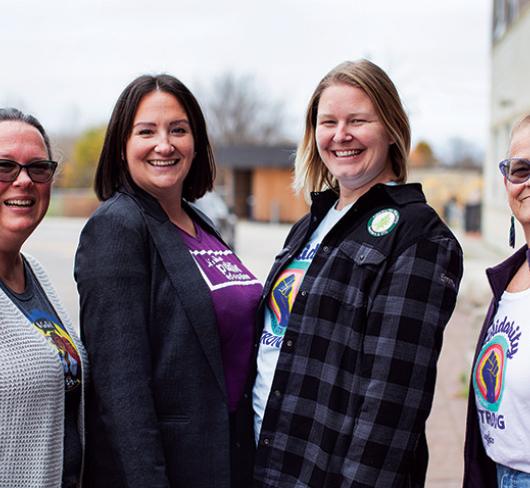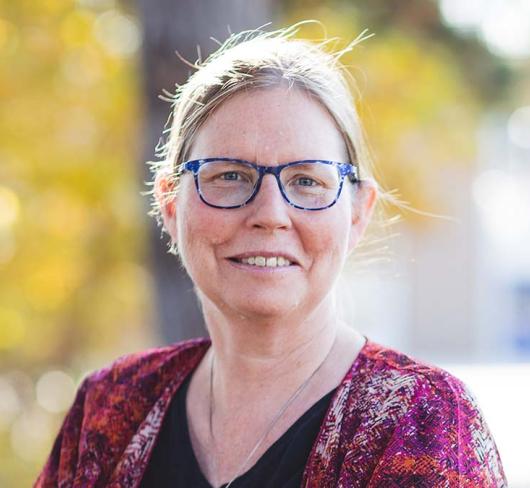
ETFO members in Peel went door-to-door in 2018 to campaign against government budget cuts. Photo by Christine Cousins
Election 2022
The Ontario government has gone to extraordinary lengths to avoid criticism by organizations like ETFO. The government lengthened the restriction period on paid advertising from six months before the election to a full year. When the Ontario Superior Court ruled that legislation unconstitutional, the government adopted Bill 307 that, for the first time in Ontario’s history, invoked the notwithstanding clause to override the court’s ruling and reinstate the sections of the legislation that had been found to violate Ontarians’ charter rights to freedom of expression.
The Progressive Conservative Party continues to lead in public opinion polls. This is despite support dropping, particularly during the third wave of the COVID-19 pandemic in the spring of 2021. Ontario is months away from the next general election on June 2, 2022, but the PCs could be re-elected to another majority government.
This context highlights the importance of direct member involvement in campaigns over the next six months. ETFO members teach students from millions of families all over the province whose partisan loyalties broadly reflect the general population in Ontario. Although the prospect of getting more involved in politics isn’t always comfortable, there will be many opportunities to make a difference over the next six months.
With the advertising restrictions, every Ontarian who wants a change in government will need to do a little more than they have in the past to impact the direction of the province. ETFO members have a role to play in promoting civic participation and voting, helping to share the issues that are at the heart of public education and participating directly in the electoral campaign. Over the next few months, up to the election on June 2, 2022, ETFO members can expect to hear about training opportunities and meetings to support their involvement in this process.
1. Promote Voting
We know ETFO members feel it is important to vote. They vote in very high numbers.
Anonymous, random sample member polls have consistently found around 95 percent voter turnout among educators.
One thing members can do to help their local campaigns is vote in advance polls. If a campaign has identified you as a supporter, they will spend resources trying to make sure you vote. Even though you are a committed voter, campaign volunteers won’t stop trying to contact you until they know you have voted. If you vote in the advance poll, they will know from Elections Ontario you have voted already and won’t spend time knocking on your door or calling you on election day. Vote in the advance polls and let them focus on others who need the encouragement.
In the last provincial election, 58 percent of eligible voters cast a ballot. That’s up from 51 percent in the previous election but far lower than the 67 percent of Canadians who turned out to vote in the 2021 federal election. Political parties tend to focus on likely voters, but personal conversations with non-voters can make a big difference. Far too many people do not think of themselves as voters. Some people will intentionally refuse to vote for a specific political reason; some Indigenous sovereigntists, for example, chose not to vote in Canadian elections in favour of participating only in their own national governance processes. However, the most common reason eligible voters stay home is disengagement.
A lot of research has been done around how citizens who do not participate become voters. You will see public pledges to vote that can be shared on social media or in other formats. This helps promote the social or civic responsibility of voting.
The Student Vote program (studentvote.ca) helps build an understanding of the electoral process for students and is more of a long-term commitment to build civic responsibility in voting. Ninety percent of parents surveyed after the program have said it gave their family an opportunity to learn more about politics.
Encouraging people to make a plan to vote has been shown to increase the rate of followthrough. One idea is to get people to check or update their voter registration online at Elections Ontario so they receive their voter card in the mail at election time. This will increase their likelihood of voting. When it is closer to the election campaign, asking people where and when they plan to vote can help. You may also want to bring friends or family with you to the polls, making it a social engagement that is harder to skip when lives inevitably get busy.
Some non-voters or people less likely to vote need to hear why it is important, what is at stake in the next election. This can be a helpful time to talk about some of the issues related to public education.
2. Promote the policies we need to build better schools and recover from the pandemic
The issues are bigger than any one government and, no matter the outcome of the election, work is needed to protect and enhance public education in Ontario. However, the dynamics of challenges and opportunities change with different governments. Voting makes a difference in that regard, but much more than voting is needed to sustain a movement in defense of public education.
Some of the worst plans of the Conservative government were stopped in their tracks by organized and popular opposition. The Ford government initially planned massive class size increases in elementary grades and proposed fundamental changes to the Full-Day Kindergarten staffing model. There was widespread popular support for striking educators in our last round of bargaining because the public understood who was standing up for public education. When it came to responding to COVID-19, every single safety measure had to be fought for by educators and their communities. The government moved significantly in response to popular pressure. Our collective action, our organizing, lobbying and protesting has worked and will continue to work, but it takes all our efforts. Educators are trusted by their communities, one of the many reasons educators make excellent organizers and community advocates.
Public schools need investment and support to help students recover from the impacts of the pandemic. We know from the Ontario Financial Accountability office that the Ford government plans to cut more than $12 billion from public education over the next 10 years. That alone will leave students and educators struggling, with those who are already marginalized further behind.
ETFO’s education platform is available at BuildingBetterSchools.ca. ETFO will do issues-based advertising in the fall and winter and will provide members with resources and information to support local organizing efforts, but conversations led by members about the issues are far more impactful than any advertisement or press release. You know what is best for Ontario public schools, and people believe you when you tell them your stories and your ideas about building better schools.
3. Get involved in the political process
Partisan polarization has been increasing in Canada, and it tends to be those most engaged in the political process who have the most contempt for an opposing party. It’s understandable if people are hesitant to wade into these acrimonious politics. But what you’ll find at a local campaign office is a wide variety of people who care about the issues facing their communities and want to make things better. Progressive politics can still be about winning people over to the ideas of greater equity and collective well-being. There are lots of ways to put that into practice in a local campaign.
Most people think about going door-to-door canvassing and speaking to people in the community, but volunteering on an election campaign can take many forms. Your skills and contributions could also be suited for some of the many organizing tasks done in a local campaign office. Campaigns have also moved to online spaces where there is more flexibility for volunteers. Increasingly, there are opportunities to contact voters through text messaging or phone banks through a computer at home.
Political parties also rely on individual donations and whether you donate to your local association or candidate or to a provincial party, there are substantial tax rebates. For those who can afford to donate and wait a few months for a tax return, a $100 donation only ends up costing $25. Donating by the end of December provides for a tax credit on your 2021 income taxes. Seventy-five percent of any donation up to $427 is returned. Donations above that are credited, but at lower rates.
The Ford government has done everything it can to stack the odds in favour of re-election. Union members across Ontario can respond by getting involved. The power of unions is in its active membership. That membership can win a new government in Ontario and fight for the public education system the people of Ontario deserve. 2022 will see pivotal moments for the future of public education in Ontario, and our collective actions can steer it in a more supportive, positive direction for all.
James Taylor is a member of the ETFO executive staff.

